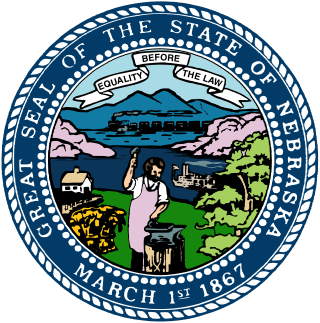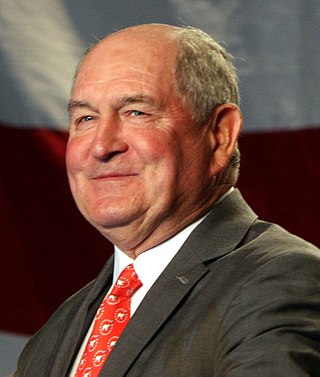
Michael Owen Johanns is an American attorney and politician who served as a United States senator from Nebraska from 2009 to 2015. He served as the 38th governor of Nebraska from 1999 until 2005, and was chair of the Midwestern Governors Association in 2002. In 2005, he was appointed by President George W. Bush to serve as the secretary of agriculture, where he served from 2005 to 2007, becoming the fourth Nebraskan to hold that position.

The 2004 North Carolina gubernatorial election was held on November 2, 2004. The general election was between the Democratic incumbent Mike Easley and the Republican nominee Patrick J. Ballantine. Easley won by 56% to 43%, winning his second term as governor. This is the last time a Democrat was elected governor of North Carolina by double digits.

The 2006 Wisconsin gubernatorial election was held on November 7, 2006. Incumbent Democratic Governor Jim Doyle ran for re-election to a second term in office. Doyle was unopposed in the Democratic primary, and he faced U.S. Representative Mark Green, who was unopposed in the Republican primary, in the general election. The campaign between Doyle and Green was competitive and hotly contested, but Doyle, whose approval ratings hovered around 50%, had the upper hand. In the end, Doyle defeated Green by a fairly comfortable margin, improving on his 2002 victory in the process.

The 2006 Alabama gubernatorial election occurred on November 7, 2006. Incumbent Republican Governor Bob Riley defeated Democratic Lieutenant Governor Lucy Baxley. Riley garnered 21% of African Americans' votes.

The 2006 Nebraska gubernatorial election was held on November 7, 2006; the primary election was held on May 9, 2006. Republican incumbent Dave Heineman was elected to a full term, defeating Democrat David Hahn.

United States gubernatorial elections were held on November 5, 2002, in 36 states and two territories. The Republicans won eight seats previously held by the Democrats, as well as the seat previously held by Minnesota governor Jesse Ventura, who was elected on the Reform Party ticket but had since renounced his party affiliation. The Democrats won 10 seats previously held by the Republicans, as well as the seat previously held by Maine governor Angus King, an independent. The elections were held concurrently with the other United States elections of 2002.

The 2008 United States Senate election in Nebraska was held on November 4, 2008. The primary elections was held on May 13. Incumbent Senator Chuck Hagel decided to retire instead of seeking a third term. Fellow Republican Mike Johanns won the open seat.

The 2002 Idaho gubernatorial election was held on November 5, 2002 to select the governor of the state of Idaho. Dirk Kempthorne, the Republican incumbent, defeated Democratic nominee Jerry Brady to win a second term, but the win was not nearly as overwhelming as Kempthorne's 1998 victory. This was the first Idaho gubernatorial election since 1978 in which the winner was of the same party as the incumbent president. This was the first time since 1962 that an incumbent Republican Governor of Idaho was re-elected.

The 2002 Georgia gubernatorial election was held on November 5, 2002. Incumbent Democratic Governor Roy Barnes sought re-election to a second term as governor. State Senator Sonny Perdue emerged as the Republican nominee from a crowded and hotly contested primary, and he faced off against Barnes, who had faced no opponents in his primary election, in the general election. Though Barnes had been nicknamed "King Roy" due to his unique ability to get his legislative priorities passed, he faced a backlash among Georgia voters due to his proposal to change the state flag from its Confederate design.

The 2010 Illinois gubernatorial election took place on November 2, 2010. Incumbent Democratic Governor Pat Quinn was elected to a full term in office, having become governor in 2009 following the impeachment and removal of Governor Rod Blagojevich. Quinn was elected as the Democratic nominee, the Illinois Green Party nominee was attorney and 2006 nominee Rich Whitney, the Republican nominee was State Senator Bill Brady, the Libertarian Party nominee was Lex Green, and Scott Lee Cohen ran as an independent.

The 2010 Tennessee gubernatorial election took place on November 2, 2010, to elect the next governor of Tennessee. Incumbent Democratic Governor Phil Bredesen was term-limited, and is prohibited by the Constitution of Tennessee from seeking a third consecutive term. Knoxville mayor and Republican nominee, Bill Haslam was elected with 65.0% of the vote, defeating Democratic nominee Mike McWherter.

The 2010 Alabama gubernatorial election took place on November 2, 2010. Incumbent Governor Bob Riley was term-limited and unable to seek re-election. The party primaries were held on June 1, 2010, with a Republican runoff on July 13. In the general election, Robert J. Bentley defeated Democrat Ron Sparks. This was the first election in which Republicans won three consecutive gubernatorial elections in the state. This was also the first time since Reconstruction that a Republican carried Colbert County, Franklin County, and Lawrence County in a gubernatorial race.

The 2010 Wisconsin gubernatorial election took place on November 2, 2010, to elect the governor and lieutenant governor of Wisconsin. The primary elections on September 14 determined which candidates advanced to the general election.

The 2010 Nebraska gubernatorial election was held on Tuesday, November 2, 2010 to elect the governor of Nebraska, who would serve a four-year term that began in January 2011. Republican incumbent Dave Heineman won, defeating Democrat Mike Meister in a landslide. Heineman easily won his party's nomination. Mark Lakers ran unopposed in the Democratic primary, but dropped out in July 2010. Attorney Mike Meister was chosen as a replacement. As of 2022, this was the last time Lancaster County voted for the Republican candidate. To date, this is the last time that the winner of the Nebraska gubernatorial election carried all counties in Nebraska.

The 2002 Iowa gubernatorial election took place November 5, 2002. Incumbent Democratic Governor of Iowa Tom Vilsack sought re-election to a second term as governor. Governor Vilsack won his party's nomination uncontested, while Doug Gross, an advisor to former Governor Terry Branstad, narrowly won the Republican Party's primary in a crowded and competitive primary election. In the general election, Vilsack was able to improve slightly on his margin of victory four years earlier to win what would be his second and final term as governor.

The 2002 Kansas gubernatorial election was held on November 5, 2002. Incumbent Governor Bill Graves, a Republican, was barred from seeking a third term by the Kansas Constitution. Kansas Insurance Commissioner Kathleen Sebelius, the Democratic nominee, ran against Kansas State Treasurer Tim Shallenburger, the Republican nominee, with Sebelius defeating Shallenburger to become the second female Governor of Kansas after Joan Finney who served as governor from 1991 to 1995.

The 2012 United States Senate election in Nebraska took place on November 6, 2012, concurrently with the 2012 U.S. presidential election as well as other elections to the United States Senate and House of Representatives and various state and local elections.

The 2002 Wisconsin gubernatorial election was held on November 5, 2002. Incumbent Republican Governor of Wisconsin Scott McCallum, who had assumed office upon the resignation of Tommy Thompson, ran for his first full term in office. McCallum won his party's nomination by defeating two minor candidates, and Attorney General of Wisconsin Jim Doyle won the Democratic primary with a little more than a third of the vote in a highly competitive primary election. In the general election, the presence of Ed Thompson, former Governor Tommy Thompson's younger brother, the Mayor of Tomah, and the Libertarian Party nominee, held both McCallum and Doyle to under fifty percent of the vote, enabling Doyle to win with 45% of the vote, defeating McCallum. As of 2022, this is the last gubernatorial election in which the Democratic candidate carried Taylor, Langlade, Marquette, Manitowoc, and Racine counties, and the last in which Juneau County did not vote for the Republican candidate, instead voting for Thompson.

The 2000 Vermont gubernatorial election took place on November 7, 2000. Incumbent Democratic Governor Howard Dean won re-election. The campaign was dominated by the fallout from the passage of a civil union bill and the subsequent backlash encapsulated by the slogan Take Back Vermont. Ruth Dwyer, the Republican nominee in 1998, ran again in 2000 and was closely tied to the Take Back Vermont movement. Howard Dean, the Democratic governor, favored civil unions and was a primary target of Take Back Vermont.

The 2014 Alabama gubernatorial election took place on November 4, 2014, to elect the governor of Alabama. Incumbent Governor Robert J. Bentley won a second term over Democrat Parker Griffith. This was the first Alabama gubernatorial race where either Choctaw and/or Conecuh counties voted Republican. This alongside the concurrent Senate race is the last time Jefferson County voted Republican in any statewide election. Bentley did not complete this term; he resigned in April 2017 due to a scandal and was succeeded by fellow Republican Kay Ivey.




















